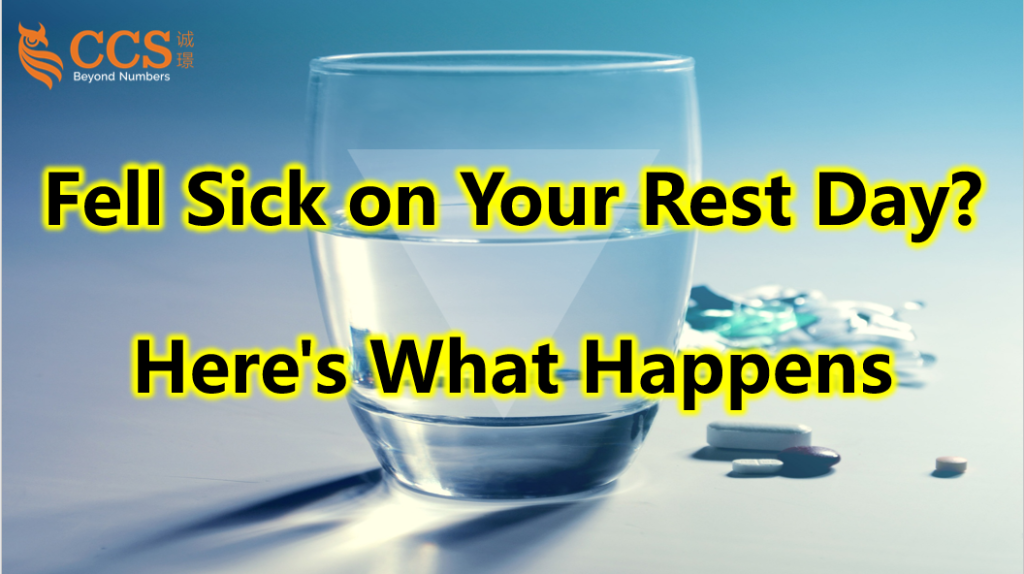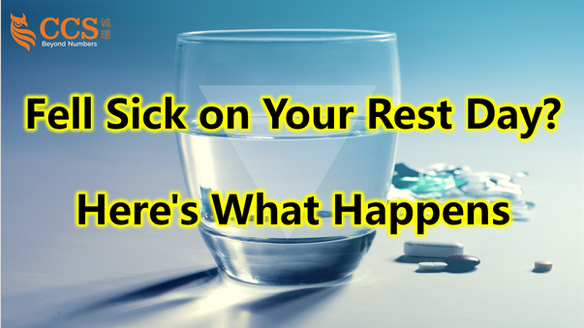Section 59 of the Employment Act is read as below:
(1) Every employee shall be allowed in each week a rest day of one whole day as may. be determined from time to time by the employer, and where an employee is allowed more than one rest day in a week the last of such rest days shall be the rest day for the purposes of this Part:
Provided that this subsection shall not apply during the period in which the employee is on maternity leave as provided under section 37, or on sick leave as provided under section 60F, or during the period of temporary disablement under the Workmen’s Compensation Act 1952, or under the Employees Social Security Act 1969.

The law says every employee must get one day of rest each week. This is called a ‘rest day’.
Usually, the employer chooses which day will be the rest day for each employee.
Employees who get sick on their rest day can take a ‘paid-sick leave’ instead. Paid-sick leave means they still get the day off work but with pay.
So if Alex’s rest day usually is Sunday, but he gets sick that day, he can take sick leave from work on Sunday and still get paid.
His rest day does not get lost or moved to next week. The sick leave replaces it, so Alex still gets a paid day off.
There is no provision for an additional or replacement rest day if an employee is ill on their pre-assigned rest day.
The provision ensures every employee gets at least one day to relax each week, whether sick or not.
So, in summary – each employee gets one rest day per week, and if they are ill on their rest day, they can take sick leave instead so they don’t miss out on the day off. The sick leave replaces the rest to ensure the employee gets a paid day to rest and recover.
Disclaimer:
The articles, templates, and other materials on our website are provided only for your reference.
While we strive to ensure the information presented is current and accurate, we cannot promise the website or its content, including any related graphics. Consequently, any reliance on this information is entirely at your own risk.
If you intend to use the content of our videos and publications as a reference, we recommend that you take the following steps:
- Verify that the information provided is current, accurate, and complete.
- Seek additional professional opinions, as the scope and extent of each issue may be unique.
免责声明:
我们网站上的文章、模板和其他材料只供参考。
虽然我们努力确保所提供的信息是最新和准确的,但我们不能保证网站或其内容,包括任何相关图形的完整性、可靠性、适用性或可用性。因此,您需要承担使用这些信息所带来的风险。
如果你打算使用我们的视频和出版物的内容作为参考,我们建议你采取以下步骤:
- 核实所提供的信息是最新的、准确的和完整的。
- 寻求额外的专业意见,因为每个问题的范围和程度,可能是独特的。
Keep in touch with us so that you can receive timely updates
请与我们保持联系,以获得即时更新。
1. Website ✍️ https://www.ccs-co.com/ 2. Telegram ✍️ http://bit.ly/YourAuditor 3. Facebook ✍
- https://www.facebook.com/YourHRAdvisory/?ref=pages_you_manage
- https://www.facebook.com/YourAuditor/?ref=pages_you_manage
4. Blog ✍ https://lnkd.in/e-Pu8_G 5. Google ✍ https://lnkd.in/ehZE6mxy
6. LinkedIn ✍ https://www.linkedin.com/company/74734209/admin/
7. Threads ✍ https://www.threads.net/@ccs_your_auditor
8. 小红书 ID ✍ 2855859831






